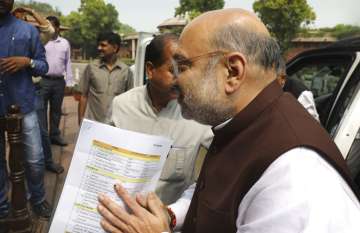The government has moved Jammu & Kashmir Reorganisation Bill in the Rajya Sabha. Union Minister Amit Shah also moved a resolution to scrap Article 370 that gives special status to Jammu & Kashmir. The step is monumental in nature and scale.
With the abrogation of Article 370, Jammu and Kashmir will now have no separate flag or Constitution and the tenure of the assembly will be for a period of five years like any other state and two union territories in the country, officials said on Monday.
The Indian Penal Code (IPC) will replace the Ranbir Penal Code (RPC) to deal with criminal matters and Article 356, under which President's rule can be imposed in any state, will also be applicable in union territories (UTs) Jammu and Kashmir, and Ladakh with the unprecedented decision of the Centre.
There will be no separate flag of Jammu and Kashmir and the tricolour will be the only national flag for the entire country, a Home Ministry official said.
There will be no separate Constitution for Jammu and Kashmir and the Indian Constitution will govern the two union territories to be created.
The Jammu and Kashmir Assembly will have a tenure of five years like all the states and UTs of Delhi and Puducherry. Till now, the Jammu and Kashmir Legislative Assembly had a tenure of six years.
In essence, abrogation of Article 370 is going to have a profound effect on Jammu & Kashmir and the country as a whole.
Check out the image below to know what will change from now on.
J&K before and after August 5
(With PTI inputs)
Also Read | J&K's head chopped off; identity lost: Ghulam Nabi Azad on Kashmir resolution
Watch | After Article 370 scrapping, govt beefs up security in Kashmir
Latest India News
